The Union is strong, but the future is uncertain
Ralitsa Kovacheva, January 27, 2011
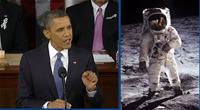 In exactly 1 hour, 1 minute and 35 seconds – the duration of his annual State of the Union Address - Barack Obama mentioned 15 times the word “children”, talked 9 minutes about the economy, 8 minutes about education, 6.5 minutes about budget spending and deficit, and 5 minutes about defence and terrorism. He was applauded 45 times, standing ovation 16 times and laughter 4 times, American media counted. The quantitative analysis identifies quite clearly the highlights in this most important speech of the US head of state for the whole year.
In exactly 1 hour, 1 minute and 35 seconds – the duration of his annual State of the Union Address - Barack Obama mentioned 15 times the word “children”, talked 9 minutes about the economy, 8 minutes about education, 6.5 minutes about budget spending and deficit, and 5 minutes about defence and terrorism. He was applauded 45 times, standing ovation 16 times and laughter 4 times, American media counted. The quantitative analysis identifies quite clearly the highlights in this most important speech of the US head of state for the whole year.
While watching the address and writing down some notes I noticed that my 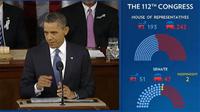 remarks were almost identical with the tweets of the major US newspapers - strong, emotional phrases, but very few specific details. This was the main point of criticism in the first comments of some journalists and analysts on Obama's address.
remarks were almost identical with the tweets of the major US newspapers - strong, emotional phrases, but very few specific details. This was the main point of criticism in the first comments of some journalists and analysts on Obama's address.
The opening point of his speech was a reference to the Cold-war era US – Soviet space contest and how the release of the Soviet “Sputnik” satellite mobilised US efforts in research and education. “This is our generation’s Sputnik moment”, Mr Obama said illustrating the need for innovation, scientific and technical research. However, if 50 years ago the incentive was the Soviet Union, which no longer exists, now there is another competitor - China, which is gaining in strength.
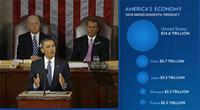 ”… Nations like China and India realized that with some changes of their own, they could compete in this new world. And so they started educating their children earlier and longer, with greater emphasis on math and science. They’re investing in research and new technologies. Just recently, China became home to the world’s largest private solar research facility, and the world’s fastest computer.”
”… Nations like China and India realized that with some changes of their own, they could compete in this new world. And so they started educating their children earlier and longer, with greater emphasis on math and science. They’re investing in research and new technologies. Just recently, China became home to the world’s largest private solar research facility, and the world’s fastest computer.”
Barack Obama identified four steps, which America has to make to achieve its future as per the words of Robert Kennedy. The first one is to promote innovation: “In a few weeks, I will be sending a budget to Congress that helps us meet that goal. We’ll invest in biomedical research, information technology, and especially clean energy technology.”
It is exactly the clean energy where America needs to find its new “Apollo 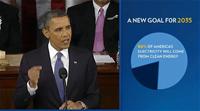 projects”, Mr Obama said, referring to the glorious years of the American space program. He set a goal by 2035 80% of America’s electricity to come from clean energy sources. The president is asking the “Congress to eliminate the billions in taxpayers’ dollars we currently give to oil companies. I don’t know if you’ve noticed, but they’re doing just fine on their own.”
projects”, Mr Obama said, referring to the glorious years of the American space program. He set a goal by 2035 80% of America’s electricity to come from clean energy sources. The president is asking the “Congress to eliminate the billions in taxpayers’ dollars we currently give to oil companies. I don’t know if you’ve noticed, but they’re doing just fine on their own.”
In order to develop innovation and new technologies which, in turn, will create new jobs America needs better and more affordable education, the president pointed out. “Over the next ten years, nearly half of all new jobs will require education that goes beyond a high school degree. And yet, as many as a quarter of our students aren’t even finishing high school. The quality of our math and science education lags behind many other nations. America has fallen to 9th in the proportion of young people with a college degree.”
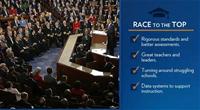 The aim, however, was not to pour money into a system that did not work, Mr Obama said, quoting as an example the Race to the Top competition, where schools from all 50 states competed for public funds by demonstrating better results. To meet the increasing demands of education, the United States need 100,000 new teachers in the fields of science, technology, engineering, and mathematics.
The aim, however, was not to pour money into a system that did not work, Mr Obama said, quoting as an example the Race to the Top competition, where schools from all 50 states competed for public funds by demonstrating better results. To meet the increasing demands of education, the United States need 100,000 new teachers in the fields of science, technology, engineering, and mathematics.
The college education should also become more affordable: “That’s why we’ve 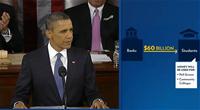 ended the unwarranted taxpayer subsidies that went to banks, and used the savings to make college affordable for millions of students", Mr Obama reminded and called on Congress to make permanent the tuition tax credit (amounting to 10,000 dollars for four years of college).
ended the unwarranted taxpayer subsidies that went to banks, and used the savings to make college affordable for millions of students", Mr Obama reminded and called on Congress to make permanent the tuition tax credit (amounting to 10,000 dollars for four years of college).
And something important which goes beyond the government's role and must be often repeated by the Bulgarian politicians too: “It’s family that first instills the love of learning in a child. Only parents can make sure the TV is turned off and homework gets done. We need to teach our kids that it’s not just the winner of the Super Bowl who deserves to be celebrated, but the winner of the science fair; that success is not a function of fame or PR, but of hard work and discipline.”
In this regard, the US President touched the sensitive topic of illegal immigration. There are many children of illegal immigrants who are excellent students, but they are threatened by deportation. Or foreign students, who come to American universities, but once obtained their degrees, they are forced to return home, he explained. “We send them back home to compete against us. It makes no sense”, the president pointed out and urged Congress to work together to solve this problem.
Step Three: Investments in Infrastructure
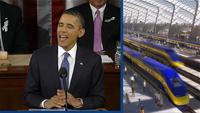 Our own engineers give to our nation’s infrastructure a “D”-grade, Mr Obama pointed out, while “South Korean homes now have greater internet access than we do. Countries in Europe and Russia invest more in their roads and railways than we do. China is building faster trains and newer airports.” So the goal is within the next 25 years 80% of Americans to have access to high-speed rail and 98% to high-speed wireless Internet.
Our own engineers give to our nation’s infrastructure a “D”-grade, Mr Obama pointed out, while “South Korean homes now have greater internet access than we do. Countries in Europe and Russia invest more in their roads and railways than we do. China is building faster trains and newer airports.” So the goal is within the next 25 years 80% of Americans to have access to high-speed rail and 98% to high-speed wireless Internet.
To help the businesses prosper the tax system has to be simplified, the loopholes 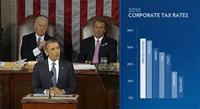 to be eliminated and the playing field to be leveled, Obama said. Savings should be used for reducing the corporate tax rate for the first time in 25 years and moreover - without adding to the deficit.
to be eliminated and the playing field to be leveled, Obama said. Savings should be used for reducing the corporate tax rate for the first time in 25 years and moreover - without adding to the deficit.
It is also important to promote exports and the government has set the target of doubling it, Barack Obama stated. He recalled the agreements with India and China, which will help to create 250,000 jobs in the US and the trade agreement with South Korea where the potential was for at least 70,000 new jobs.
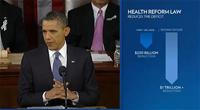 Stressing on the new opportunities but without mentioning the unemployment, the president didn't avoid the issue of the healthcare reform. He, though, approached it jokingly: “Now, I’ve heard rumors that a few of you have some concerns about the new health care law.” He called on the Congress to co-operate for improving the legislation so as to make health care better and more accessible. “So instead of re-fighting the battles of the last two years, let’s fix what needs fixing and move forward”, Obama called on. He underlined that he was not willing to “go back to the days when insurance companies could deny someone coverage because of a pre-existing condition.”
Stressing on the new opportunities but without mentioning the unemployment, the president didn't avoid the issue of the healthcare reform. He, though, approached it jokingly: “Now, I’ve heard rumors that a few of you have some concerns about the new health care law.” He called on the Congress to co-operate for improving the legislation so as to make health care better and more accessible. “So instead of re-fighting the battles of the last two years, let’s fix what needs fixing and move forward”, Obama called on. He underlined that he was not willing to “go back to the days when insurance companies could deny someone coverage because of a pre-existing condition.”
The critical fourth step, according to Barack Obama is “to make sure we aren’t buried under a mountain of debt”. That was the most concrete proposal made by the President in the entire speech: to freeze annual domestic spending of the US government for the next five years, which will reduce the budget deficit by more than 400 billion dollars. Within these cuts the government has already frozen the federal employees' salaries for the next two years. The Secretary of Defence has also agreed to make significant cuts in spending.
But the cost cuts should not come at the expense of innovation and education, 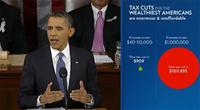 Mr Obama warned, admitting that the proposed cuts would not be enough. That's why, for example, the health reform should be continued to further reducing the healthcare costs. At the same time, solution should be sought to strengthen Social Security for future generations, “without subjecting Americans’ guaranteed retirement income to the whims of the stock market”.
Mr Obama warned, admitting that the proposed cuts would not be enough. That's why, for example, the health reform should be continued to further reducing the healthcare costs. At the same time, solution should be sought to strengthen Social Security for future generations, “without subjecting Americans’ guaranteed retirement income to the whims of the stock market”.
“And if we truly care about our deficit, we simply cannot afford a permanent extension of the tax cuts for the wealthiest 2% of Americans”, Mr. Obama said. “Before we take money away from our schools, or scholarships away from our students, we should ask millionaires to give up their tax break.”
The president also promised a serious reform of the administration because "we live and do business in the information age, but the last major reorganization of the government happened in the age of black and white TV.” Barack Obama announced that in the coming months, his administration would table a proposal to merge, consolidate, and re-organise the federal government and intended to push Congress to 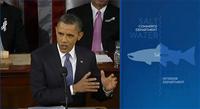 pass it. He gave some striking examples of the administration's ineffectiveness - for instance, the existence of twelve different agencies dealing with exports. Then there’s my favourite example, the president laughed: “The Interior Department is in charge of salmon while they’re in fresh water, but the Commerce Department handles them in when they’re in salty water. And I hear it gets even more complicated once they’re smoked.”
pass it. He gave some striking examples of the administration's ineffectiveness - for instance, the existence of twelve different agencies dealing with exports. Then there’s my favourite example, the president laughed: “The Interior Department is in charge of salmon while they’re in fresh water, but the Commerce Department handles them in when they’re in salty water. And I hear it gets even more complicated once they’re smoked.”
To rebuild people's faith in the institutions, they must know how and where their taxes are being spent and when their elected representatives are meeting with lobbyists, Barack Obama noted and urged Congress to follow the White House`s example by publishing all this information online.
American media commented that this year the audience was far more reserved and 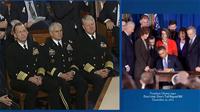 reticent to president’s address. If there were stone faces in the hall, they were those of the high military officials. Sitting on the first row they applauded sluggishly and with some hesitation Obama's words about the end of the Iraq war. Their reaction in regard to Afghanistan was even cooler, and their faces literally froze when the president mentioned repealing the ban for homosexuals to serve in the army: “Starting this year, no American will be forbidden from serving the country they love because of who they love.“
reticent to president’s address. If there were stone faces in the hall, they were those of the high military officials. Sitting on the first row they applauded sluggishly and with some hesitation Obama's words about the end of the Iraq war. Their reaction in regard to Afghanistan was even cooler, and their faces literally froze when the president mentioned repealing the ban for homosexuals to serve in the army: “Starting this year, no American will be forbidden from serving the country they love because of who they love.“
As a last year success Mr Obama pointed the new START treaty signed with Russia and its ratification by Congress (on January 26 the Treaty has also approved by the upper house of Russian parliament), as well as the reform of NATO. Expectedly, the president concluded his speech by saying “our journey goes forward, and the state of our union is strong.”
As expected, the republicans criticised Obama's speech because of his intention to increase spending on innovation, education and social activities while talking about deficit reduction. Journalists and analysts rightly pointed out that the president neglected to comment on painful topics such as unemployment or punishment of those responsible for the financial crisis and the lack of specifics in most of his intentions. This was a more pre-electoral than a governmental speech, though Obama explicitly said that "at stake right now is not who wins the next election”.
American colleagues even commented that in this speech Obama had 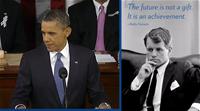 regained the good shape back from the election campaign when he was speaking confidently and inspirationally. Many of the things Obama says now, he wrote in his book "The Audacity of Hope" from the time when he was a senator. Unlike most politicians, he seems to really believe in what he says. The question is whether the oral skills would be sufficient to secure him another 4-year term in the White House.
regained the good shape back from the election campaign when he was speaking confidently and inspirationally. Many of the things Obama says now, he wrote in his book "The Audacity of Hope" from the time when he was a senator. Unlike most politicians, he seems to really believe in what he says. The question is whether the oral skills would be sufficient to secure him another 4-year term in the White House.